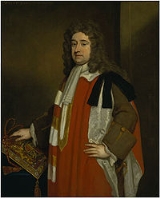
William Legge, 1st Earl of Dartmouth
Encyclopedia

George Legge, 1st Baron Dartmouth
Admiral George Legge, 1st Baron Dartmouth PC was an English naval commander who gave distinguished service to both Charles II and James II.-Biography:...
, succeeded to his father's barony in 1691. In 1702 he was appointed a member of the Board of Trade and Plantations, and eight years later he became Secretary of State for the Southern Department
Secretary of State for the Southern Department
The Secretary of State for the Southern Department was a position in the cabinet of the government of Kingdom of Great Britain up to 1782.Before 1782, the responsibilities of the two British Secretaries of State were divided not based on the principles of modern ministerial divisions, but...
and joint keeper of the signet for Scotland
Scotland
Scotland is a country that is part of the United Kingdom. Occupying the northern third of the island of Great Britain, it shares a border with England to the south and is bounded by the North Sea to the east, the Atlantic Ocean to the north and west, and the North Channel and Irish Sea to the...
. In 1711 he was created Viscount Lewisham and Earl of Dartmouth
Earl of Dartmouth
Earl of Dartmouth is a title in the Peerage of Great Britain. It was created in 1711 for William Legge, 2nd Baron Dartmouth. The Legge family descended from Edward Legge, Vice-President of Munster. His eldest son William Legge was a Royalist army officer and close associate of Prince Rupert of the...
; in 1713 he exchanged his offices for that of Lord Privy Seal
Lord Privy Seal
The Lord Privy Seal is the fifth of the Great Officers of State in the United Kingdom, ranking beneath the Lord President of the Council and above the Lord Great Chamberlain. The office is one of the traditional sinecure offices of state...
, which he held until the end of 1714. After a long period of retirement from public life he died on 15 December 1750. Dartmouth's eldest son George Legge, Viscount Lewisham (c. 1703-1732), predeceased his father, leaving a son, William
William Legge, 2nd Earl of Dartmouth
William Legge 2nd Earl of Dartmouth PC, FRS , styled as Viscount Lewisham from 1732 to 1750, was a British statesman who is most remembered for his part in the government before and during the American Revolution....
. Another son of the first earl was Henry Bilson-Legge, who later served as Chancellor of the Exchequer
Chancellor of the Exchequer
The Chancellor of the Exchequer is the title held by the British Cabinet minister who is responsible for all economic and financial matters. Often simply called the Chancellor, the office-holder controls HM Treasury and plays a role akin to the posts of Minister of Finance or Secretary of the...
.
In politics he was a moderate; himself a Tory he was prepared to work with moderate Whigs. He earned the regard of Robert Harley
Robert Harley
Robert Harley may refer to:*Robert Harley , English statesman, Member of Parliament for Radnor and Herefordshire*Robert Harley , British Member of Parliament for Radnor...
, another believer in moderation; Dartmouth in return remained a loyal friend after Harley's downfall. He also had the confidence of Queen Anne, who praised him as "an honest man."As a Minister though far from brilliant he earned a reputation for competence and hard work. He was also noted for discretion; foreign ambassadors complained that it would be easier to get information from a brick wall. In private life his fondness for laughing at his own jokes led to his nickname "the Jester".
The Dartmouth family lived at Sandwell Hall (since demolished) in the Sandwell Valley
Sandwell Valley
Sandwell Valley is an area of green belt in the West Midlands of England, on the border of Birmingham and West Bromwich, with Walsall at its northern end....
.

